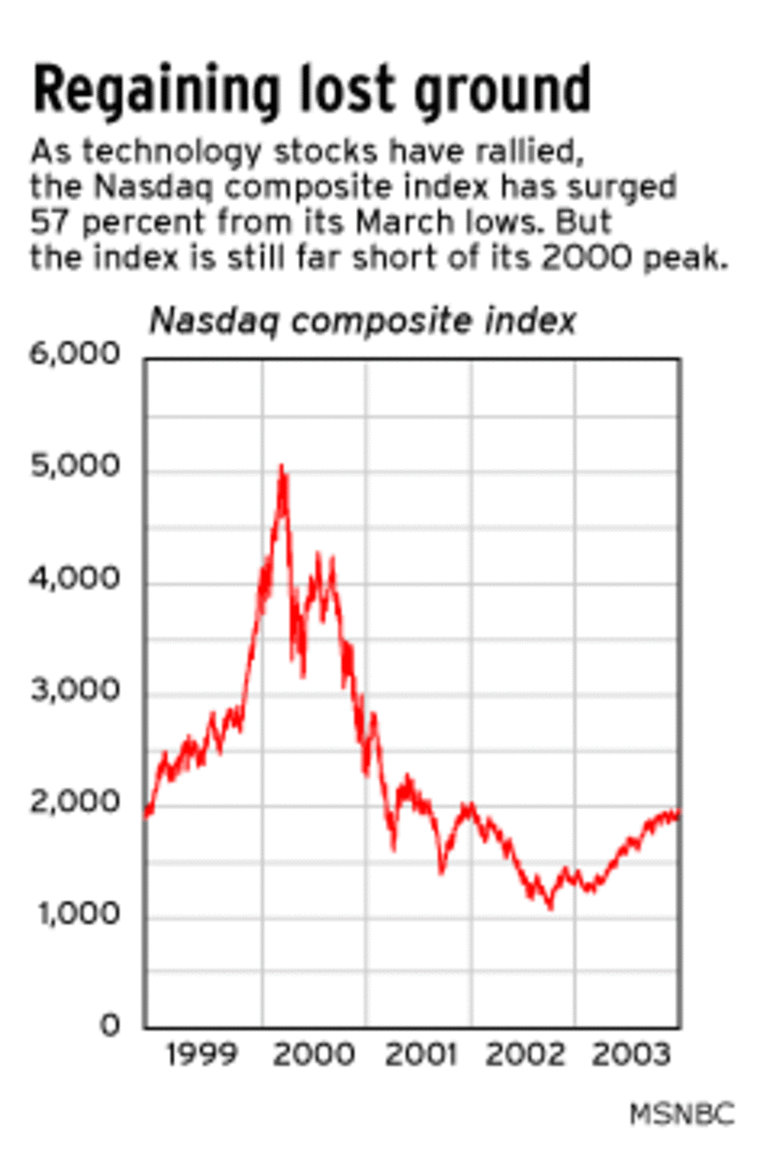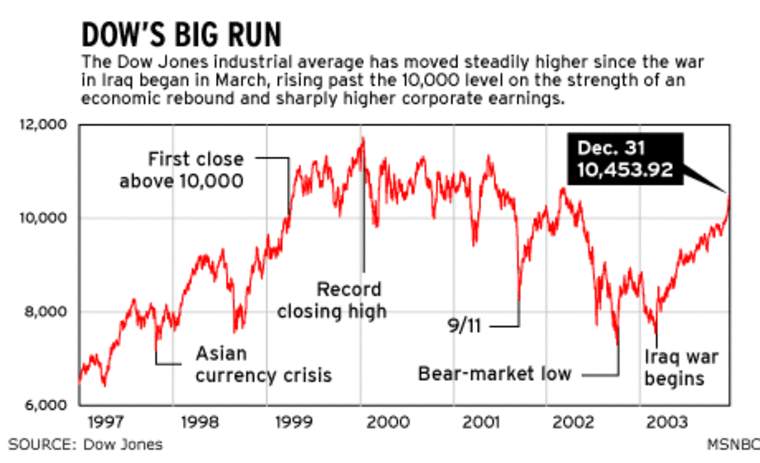Despite a war in Iraq, a new round of Wall Street scandals and an economy that struggled through much of 2003, Wall Street thrilled investors with a remarkable comeback after a grueling three-year losing streak.
The market even managed to end on a high note, as the two most widely watched measures of broad performance rose Wednesday to their highest closing levels in more than 20 months. The Dow Jones industrial average ended the year with a gain of more than 25 percent, while the S&P 500 gained 26 percent.
And few investors could complain about the stunning performance of the Nasdaq, home to tech giants including Microsoft, Intel and Cisco Systems as well as many small-cap issues. Even after a small downturn Wednesday the Nasdaq composite index ended the year above the 2000 level for a gain of 50 percent. (MSNBC is a joint venture of Microsoft and NBC.)
Most of the gains were achieved in a remarkable run that began in March, just before the missiles began flying in the Iraq war.
“There was a lot of pent-up demand to unleash because the market was languishing before the Iraq war,” remarked Peter Dunay, chief investment strategist at independent brokerage firm Wall Street Access. “And there was so much stimulus in the system that the stock market was forecasting a strong rise in corporate earnings later in the year."
While traders are celebrating the long-awaited return of the bull market, many are asking whether the good times can continue, and some are warning that tough challenges lie ahead for investors in 2004.
“A lot of the easy money has already been made,” said John Caldwell, chief investment officer at McDonald Financial Group, who predicts that returns in 2004 are unlikely to match those of 2003. “It’ll be a selective process. It'll be harder to find value.”
Bullish investors say the market’s nine-month rally is supported by strong economic data and a revival in earnings growth. This was most evident in the third quarter, when U.S. companies recorded their best year-over-year earnings growth in three years. Companies also began to report good revenue growth, evidence that earnings grew because of rising demand and not simply because of cost-cutting.

Similarly the economy snapped out of its funk in 2003, with gross domestic product growing at an 8.2 percent annual rate in the third quarter, the strongest performance since early 1984. But more bearish observers contend that the year's strong growth was fueled mainly by a unique convergence of tax cuts and low interest rates that is unlikely to be repeated in 2004.
Still, most investors expect the market’s advance will continue in 2004, but at a more moderate pace. As long as the economy continues to grow next year as expected, corporate earnings should improve and be reflected in higher stock prices.
Another factor likely to buoy stocks and the economy is next November's presidential election, said Kent Engelke, markets strategist at Anderson & Strudwick. Historically election years are positive for the stock market because incumbents want to keep the economy afloat and therefore rarely move to cut spending or raise taxes.
Many observers believe the Federal Reserve is unlikely to raise short-term interest rates, which are already at record lows, until after the November election. But even a hint of rising rates could dampen consumer and business spending, and that in turn may weaken stock prices.
Analysts also say more evidence of wrongdoing in the mutual fund industry, which first made headlines in September, could weigh on stocks in 2004, and a continued decline in the value of the U.S. dollar might discourage investment from overseas. More geopolitical uncertainty stemming from the U.S. occupation of Iraq and the continuing threat of terrorist attacks also could limit the market’s gains.
"I believe 2004 will be another up year for the market, but what will happen in 2005 is a concern," Engelke said. "The euphoria of the election will have worn off and it’ll be back to business as usual."
